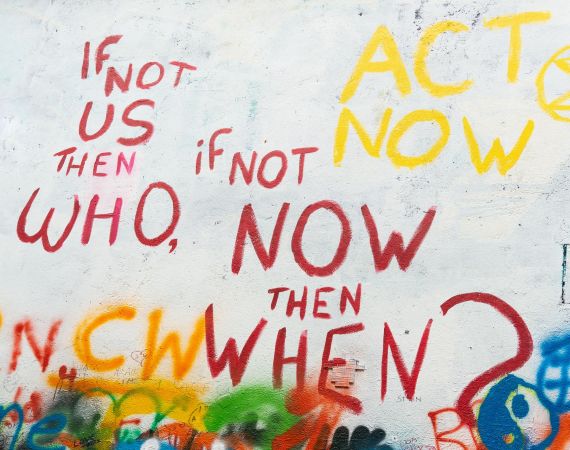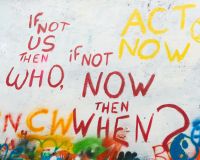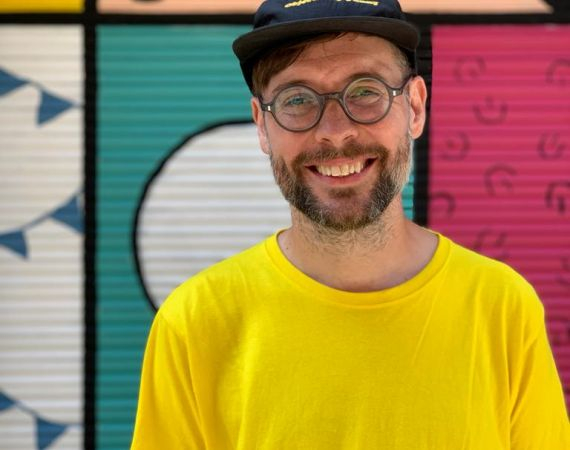Posted on Wed 16 Nov 2022
The Future Is Collective: Anders Morris Knight on Audience Development
Anders Morris-Knight, Audience Development Associate on The Future Is Collective, reflects on his time working with independent freelancers in Bristol in 2022

Posted by

Anders Morris Knight
Creative consultant and coach with 15+ years experience in the arts. Anders has supported a range of cultural festivals, organisations and creatives including work in film, performance, music and comedyProject

The Future is Collective
The Future is Collective was a Watershed programme of work propelling community and climate activism by offering support and development to freelance creatives (2021-2022).Play audio description of this page:
Anders Morris-Knight worked with us at Pervasive Media Studio and Watershed in 2022 as an Audience Development Associate as part of our The Future Is Collective project. They supported freelancers, from within the Pervasive Media Studio and BFI Film Hub South West communities as well as the wider sector, whose creative practices include climate and community activism.
We asked Anders to reflect on his time spend with us and here's what he had to say...
Hello, I’m Anders.
A creative consultant and coach. For over 15 years I have worked in the arts as a marketing professional. The latter involves thinking up various ways to get bums on seats. To sell tickets. To develop audiences. My work has largely been to understand people so that I can get them excited, engaged, passionate and inspired. I have loved telling stories that build interest in the organisations and projects I’ve worked for - from comedy festivals to a crowdfunding campaign for a film about a coffin maker.
Since the pandemic I have retrained as a coach. This work has used a lot of my communication and interpersonal skills (is this starting to read like a job application?) but also to build on them. Part of this process has been about learning how to hold space for people, to give them an opportunity to reflect, to think, to be heard.
Coaching also involves asking pertinent questions. Here's the first...
Why the heck am I writing this?
I spent Summer 2022 as part of The Future is Collective talking to freelancers whose work focusses on community / climate activism.
In response to the pandemic Watershed wanted to offer support to creatives who were trying to drive positive change. As part of this I met with people (on and offline) to provide advice and mentoring on audience development.
Arts Council England defines audience development as activity “undertaken specifically to meet the needs of existing and potential audiences, visitors and participants and to develop ongoing relationships with audiences”.
To offer some insights into the issues that came up, and how you can maintain and improve your audience relationships here are some other questions for you to consider.
What do you do?
I met with campaigners, visual artists, composers, producers. Each had different ways of describing themselves and their work. I was fascinated to hear about all of it.
Almost everyone though was tentative and found confidently describing themselves and their work challenging.
What do you say in your Twitter bio, on your business card, when introduced to a stranger? Perhaps it’s worth practising and refining. It’s important to be comfortable with this. A lot of people seem to not want to be pinned down or restricted. Or more often than not imposter syndrome (that eternal enemy!) stops us from feeling able to say “I’m an artist”.
What do you actually do?
So, you’re an artist, or a creative technologist, or a performer, or a multi-disciplinary… but what do your days really look like? What do you actually spend most of your time doing?
Every freelancer I spoke with wore so many different hats day-to-day that even 80s Elton John would be getting jealous. As creatives we have to be our own administrators, office managers, marketing coordinators, producers and of course fundraisers.
A lot of these functions are essential to our creative work. They do take our focus away from it though. Are there ways to structure your work so that you can protect days or chunks of time to concentrate on being creative? Do you set an Out Of Office to communicate when you are available on email and not? Do you have to do it all yourself?
Who can support you with your work?
This is one of my favourite coaching questions. None of us are alone. One of the facets of Pervasive Media Studio that I love so much is its open, interruptible, collaborative culture. Find your community and build your team. Don’t forget to write funding applications that include and pay people to round out the skills you need (and may not have in abundance). Funders will reward you for being responsible and recognising that you can’t do it all.
Over the course of my career I have learned that the vast majority of people are very happy to share what they know. When I started a record label I had no idea how you literally made a record. So myself and my label mates asked around. And the people that had been there before gave us the benefit of their experience - and helped us avoid repeating some of their mistakes. This kind of mentoring is something that I have regularly sought out (and offered to others) since.
How would you like it to be?
This is another classic GROW coaching question. In marketing I often ask clients ‘where are you now?’ and ‘where do you want to get to?.’
It’s important to make time to consider your priorities and plan accordingly. Successful projects build in time to reflect, take stock, evaluate and adjust the plan. This could be as brief and simple as enjoying a coffee and a chat with a friend or creative ally. Without it though you will be marching blindly on and may end up somewhere you don’t want to be.
Why haven’t you mentioned audiences much?
The truth is these other issues are a fundamental part of making great work and communicating well about it. By managing your time, your tasks and your team you can give yourself fully to your work and then reach out to the relevant people to in the most appropriate ways.
Who cares?
This sounds a bit harsh. It is worth noting though that not everyone is going to be interested in what you do. Make sure you have a process for identifying who is passionate about your work. This could include funders, existing or prospective clients, collaborators or those infamous bums on seats. Be as specific as you can about them. Give Segmentation, Targeting and Positioning a quick google. How old is your audience? Are they based in a specific place? Are they digital natives or silver surfers? The more you know about your audiences the better you can build a rapport with them. Crucially, if you want to connect with your audiences, be inclusive and accessible, then never assume your audience is the same as you.
By identifying who your most important and engaged audiences are you can also understand the best ways to communicate with them. For example, if you know what type of person your work is aimed at (demographically) then you can ensure you are using the right social media, targeting the right press for coverage / opinion pieces and hosting your work in the best places for them to access it.
Mirror, mirror on the wall…who’s not doing a bad job after all?
A rewarding part of this project was being able to tell people that they were doing good. The pandemic has clearly affected a lot of people’s confidence and self assurance. How delightful it was then to be able to look over and discuss people’s social media, websites and other output and say “Bravo!”
As freelancers it’s hard to shake the feeling that everyone else is doing better than us. That we are half assing it as Ron Swanson would say. Part of that stems from occupying too many roles at once - there’s a reason why organisations employ several people to do several jobs (again, what do you actually do each day?).
But trust me if you’re reading this then you’re probably doing a much better job than your anxious / overly ambitious inner critic wants you to think. Listen to your instincts. Be as kind and generous to yourself as you would to a friend. And if you do need a confidence boost - why not drop me a line!
You can find out more about Anders and get in touch via his website here

Anders Morris Knight was an Audience Development Associate on Watershed's The Future is Collective programme, supported by Arts Council England.